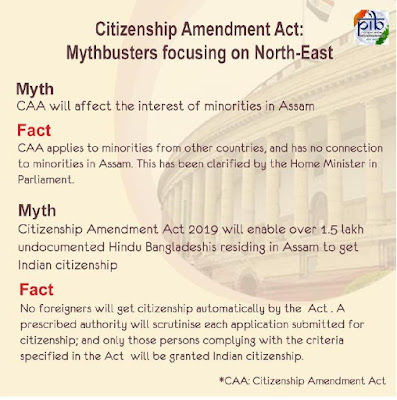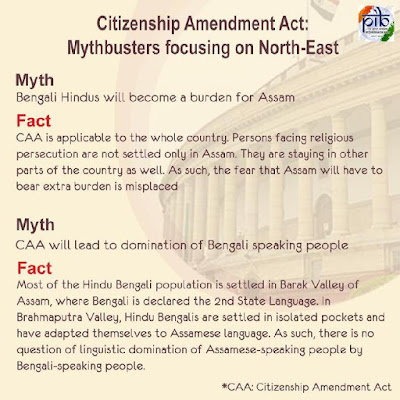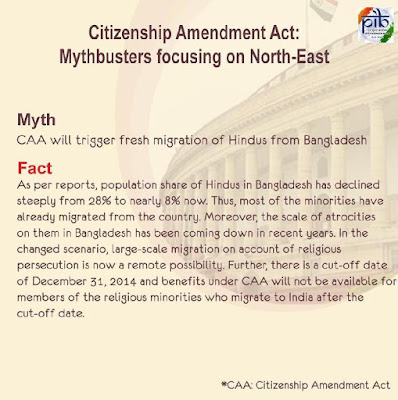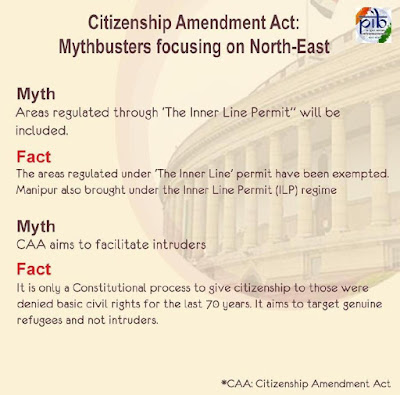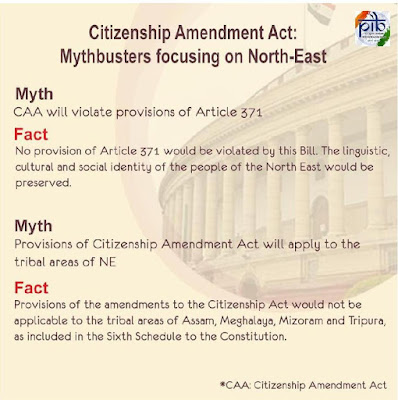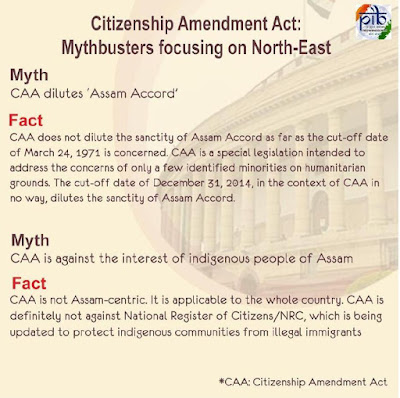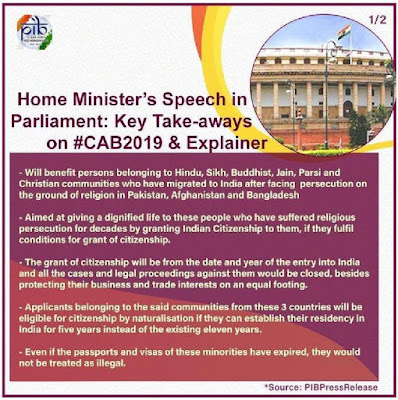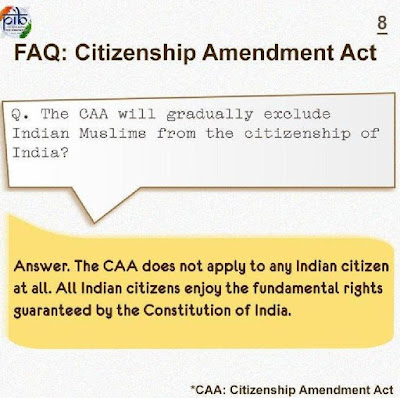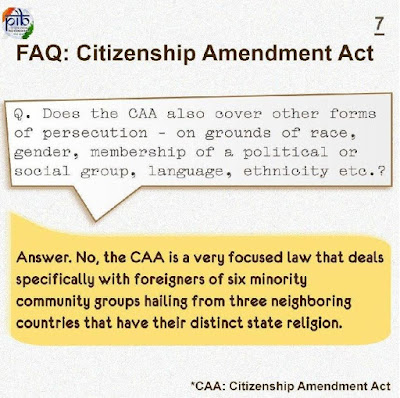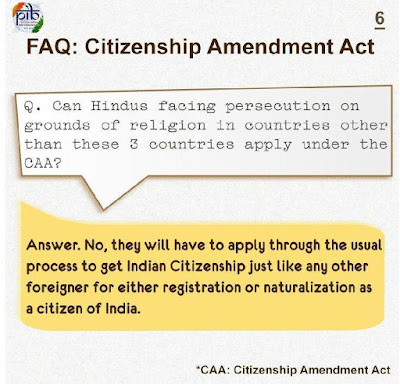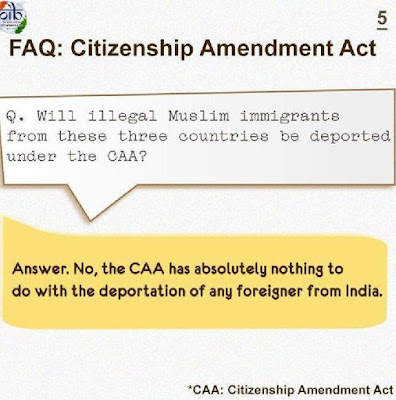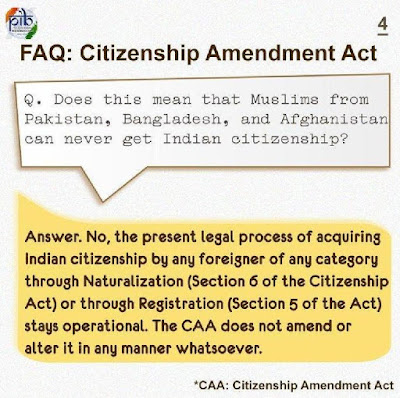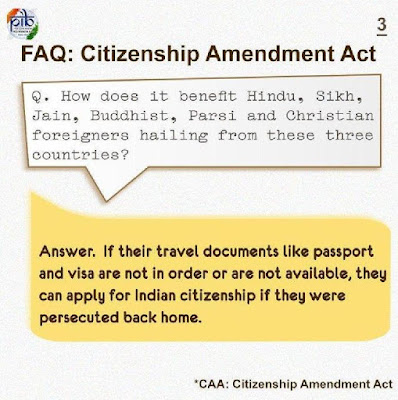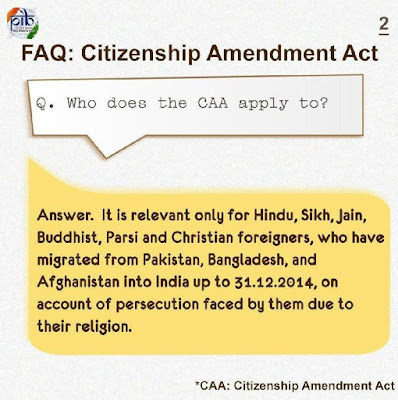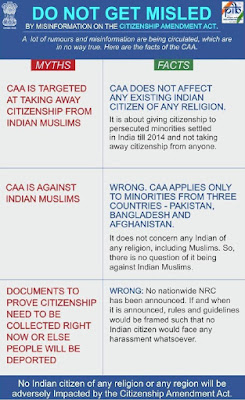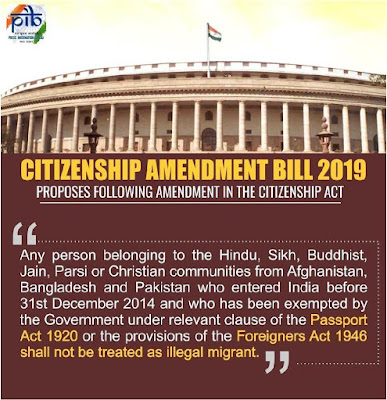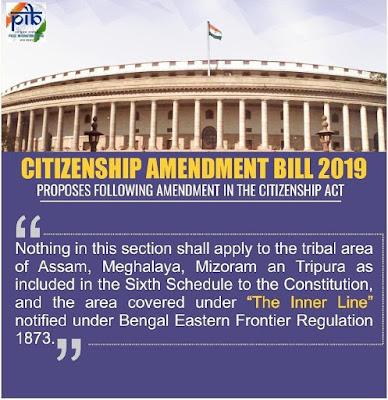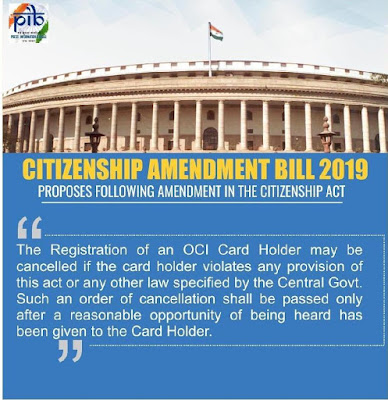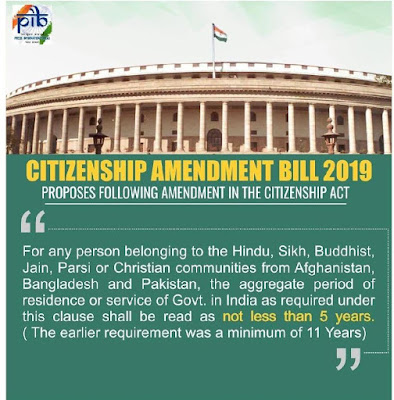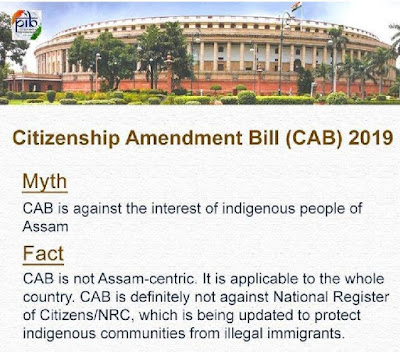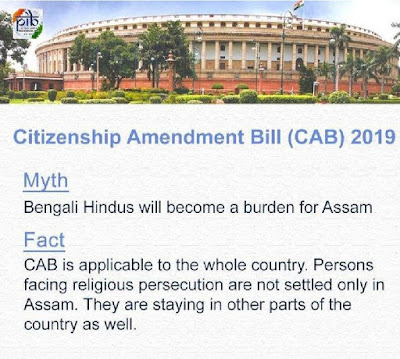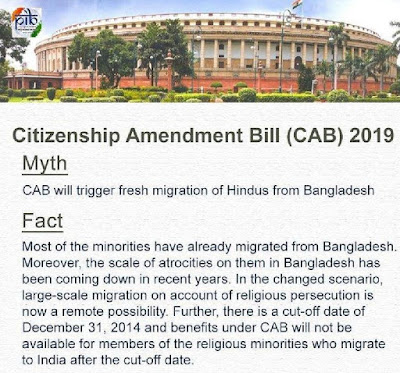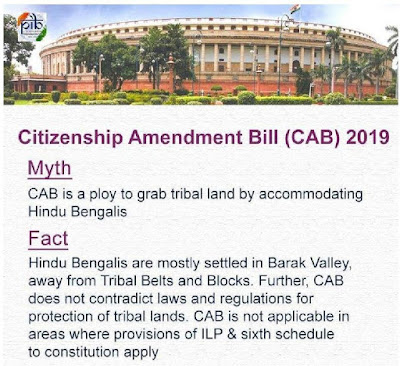CAA-NRC: Fact or Myth – Complete Details
Contents
- 1 CAA-NRC: Fact or Myth – Complete Details
- 1.1 Citizenship Amendment Act:Mythbusters focusing on North-East
- 1.2 Citizenship Amendment Act:Mythbusters focusing on North-East
- 1.3 Citizenship Amendment Act:Mythbusters focusing on North-East
- 1.4 Citizenship Amendment Act:Mythbusters focusing on North-East
- 1.5 Citizenship Amendment Act:Mythbusters focusing on North-East
- 1.6 Citizenship Amendment Act:Mythbusters focusing on North-East
- 1.7 Home Minister’s Speech in Parliament: Key Take-aways on #CAB2019 & Explainer
- 1.8 FAQ: Citizenship Amendment Act
- 1.9 FAQ: Citizenship Amendment Act
- 1.10 FAQ: Citizenship Amendment Act
- 1.11 FAQ: Citizenship Amendment Act
- 1.12 FAQ: Citizenship Amendment Act
- 1.13 FAQ: Citizenship Amendment Act
- 1.14 FAQ: Citizenship Amendment Act
- 1.15 FAQ: Citizenship Amendment Act
- 1.16 FAQ: Citizenship Amendment Act
- 1.17 FAQ: Citizenship Amendment Act
- 1.18 Citizenship Amendment Bill (CAB) 2019
- 1.19 Citizenship Amendment Bill (CAB) 2019
- 1.20 Citizenship Amendment Bill (CAB) 2019
- 1.21 Citizenship Amendment Bill (CAB) 2019
- 1.22 Citizenship Amendment Bill (CAB) 2019
- 1.23 Citizenship Amendment Bill (CAB) 2019
- 1.24 Citizenship Amendment Bill (CAB) 2019
About the Citizenship Amendment Act (CAA) 2019, fully details and Myth-fact description detailed as below, which is available on the website of Press Information Bureau (PIB).
PRIME MINISTER ON CAA PROTESTS
The need of the hour is for all of us to work together for the development of India and the empowerment of every Indian, especially the poor, downtrodden and marginalized. We cannot allow vested interest groups to divide us and create disturbance.
PRIME MINISTER ON CITIZENSHIP AMENDMENT ACT
Violent protests on the Citizenship Amendment Act are unfortunate and deeply distressing. Debate, discussion and dissent are essential parts of democracy but, never has damage to public property and disturbance of normal life been a part of our ethos.
PRIME MINISTER ON CAA PROTESTS
The Citizenship Amendment Act, 2019 was passed by both Houses of Parliament with overwhelming support. Large number of political parties and MPs supported its passage. This Act illustrates India’s centuries old culture of acceptance, harmony, compassion and brotherhood.
PRIME MINISTER ON CAA PROTESTS
I want to unequivocally assure my fellow Indians that CAA does not affect any citizen of India of any religion. No Indian has anything to worry regarding this Act. This Act is only for those who have faced years of persecution outside and have no other place to go except India.
PRIME MINISTER ON CITIZENSHIP AMENDMENT ACT
This is the time to maintain peace, unity and brotherhood. It is my appeal to everyone to stay away from any sort of rumor mongering and falsehoods.
Citizenship Amendment Act:Mythbusters focusing on North-East
Myth
CAA will affect the interest of minorities in Assam.
Fact
CAA applies to minorities from other countries, and has no connection to minorities in Assam. This has been clarified by the Home Minister in Parliament.
Myth
Citizenship Amendment Act 2019 will enable over 1.5 lakh undocumented Hindu Bangladeshis residing in Assam to get Indian citizenship.
Fact
No foreigners will get citizenship automatically by the Act. A prescribed authority will scrutinize each application submitted for citizenship; and only those persons complying with the criteria specified in the Act will be granted Indian citizenship.
Citizenship Amendment Act:
Mythbusters focusing on North-East
Myth
Bengali Hindus will become a burden for Assam.
Fact
CAA is applicable to the whole country. Persons facing religious persecution are not settled only in Assam. They are staying in other parts of the country as well. As such, the fear that Assam will have to bear extra burden is misplaced.
Myth
CAA will lead to domination of Bengali speaking people
Fact
Most of the Hindu Bengali population is settled in Barak Valley of Assam, where Bengali is declared the 2nd State Language. In Brahmaputra Valley, Hindu Bengalis are settled in isolated pockets and have adapted themselves to Assamese language. As such, there is no question of linguistic domination of Assamese-speaking people by Bengali-speaking people.
Citizenship Amendment Act:
Mythbusters focusing on North-East
Myth
CAA will trigger fresh migration of Hindus from Bangladesh.
Fact
As per reports, population share of Hindus in Bangladesh has declined steeply from 28% to nearly 8% now. Thus, most of the minorities have already migrated from the country. Moreover, the scale of atrocities on them in Bangladesh has been coming down in recent years. In the changed scenario, large -scale migration on account of religious persecution is now a remote possibility. Further, there is a cut-off date of December 31, 2014 and benefits under CAA will not be available for members of the religious minorities who migrate to India after the cut-off date.
Citizenship Amendment Act:
Mythbusters focusing on North-East
Myth
Areas regulated through ‘The Inner Line Permit” will be included.
Fact
The areas regulated under ‘The Inner Line’ permit have been exempted. Manipur also brought under the Inner Line Permit (ILP) regime.
Myth
CAA aims to facilitate intruders.
Fact
It is only a Constitutional process to give citizenship to those were denied basic civil rights for the last 70 years. It aims to target genuine refugees and not intruders.
Citizenship Amendment Act:
Mythbusters focusing on North-East
Myth
CAA will violate provisions of Article 371
Fact
No provision of Article 371 would be violated by this Bill. The linguistic, cultural and social identity of the people of the North-East would be preserved.
Myth
Provisions of Citizenship Amendment Act will apply to the tribal areas on NE.
Fact
Provisions of the amendments to the Citizenship Act would not be applicable to the areas of Assamm Meghalaya, Mizoram and Tripura, as included in the Sixth Scheduled to the Constitution.
Citizenship Amendment Act:
Mythbusters focusing on North-East
Myth
CAA dilutes ‘Assam Accord’
Fact
CAA does not dilute the sanctity of Assam Accord as far as the cut-off date of March 24, 1971 is concerned. CAA is a special legislation intended to address the concerns of only a few identified minorities on humanitarian grounds. The cut-off date of December 31, 2014, in the context of CAA in no way, dilutes the sanctity of Assam Accord.
Myth
CAA is against the interest of indigenous people of Assam
Fact
CAA is not Assam-centric. It is applicable to the whole country. CAA is definitely not against National Register of Citizens/NRC, which is being updated to protect indigenous communities from illegal immigrants.
HOME Minister’s Speech in Parliament: Key Take-aways on #CAB2019 & Explainer
– The linguistic, cultural and social identity of the people of the North East region would be preserved.
– The provisions of the amendments to the Act would not apply to tribal area of Assam, Meghalaya, Mizoram or Tripura as included in the Sixth Schedule to the Constitution and the area covered under ‘The Inner Line’ notified under Bengal Eastern Frontier Regulation, 1873. Manipur has been brought under the Inner Line Permit (ILP) regime through a Gazette Notification.
– No provision of Article 371 would be violated
– Not against any minority in India and the rights of each Indian Citizen will be equally protected.
– While nowhere does this bill target India’s minority community, no illegal immigrants would be allowed to stay in the country.
Home Minister’s Speech in Parliament: Key Take-aways on #CAB2019 & Explainer
-Will benefit persons belonging to Hindu, Sikh, Buddhist, Jain, Parsi and Christian communities who have migrated to India after facing persecution on the ground of religion in Pakistan, Afghanistan and Bangladesh.
– Aimed at giving a dignified life to these people who have suffered religious persecution for decades by granting Indian Citizenship to them, if they fulfil conditions for grant of citizenship.
– The grant of citizenship will be from the date and year of the entry into India and all the cases and legal proceedings against them would be closed, besides protecting their business and trade interests on an equal footing.
– Applicants belonging to the said communities from these 3 countries will be eligible for citizenship by naturalisation if they can establish their residency in India for five years instead of the existing eleven years.
– Even if the passports and visas of these minorities have expired, they would not be treated as illegal.
FAQ: Citizenship Amendment Act
Q. What are the rules for citizenship under CAA?
Answer. Appropriate rules under the CAA are being framed. They will operationalize various provisions of the CAA.
FAQ: Citizenship Amendment Act
Q. CAA will be followed by NRC and all migrants except Muslims will be given citizenship and Muslims will be sent to detention camps?
Answer. The CAA has nothing to do with NRC. The legal provisions regarding NRC have been part of The Citizenship Act, 1955 since December 2004.
Q. The CAA will gradually exclude Indian Muslims from the citizenship of India?
Answer. The CAA does not apply to any Indian citizen at all. All Indian citizens enjoy the fundamental rights guaranteed by the Constitution of India.
FAQ: Citizenship Amendment Act
Q. Does the CAA also cover other forms of persecution – on grounds of race, gender, membership of a political or social group, language, ethnicity etc.?
Answer. No, the CAA is a very focused law that deals specifically with foreigners of six minority community groups hailing from three neighboring countries that have their distinct state religion.
FAQ: Citizenship Amendment Act
Q. Can Hindus facing persecution on grounds of religion in countries other than these 3 countries apply under the CAA?
Answer. No, they will have to apply through the usual process to get Indian Citizenship just like any other foreigner for either registration or naturalization as a citizen of India.
FAQ: Citizenship Amendment Act
Q. Will illegal Muslim immigrants from these three countries be deported under the CAA?
Answer. No, the CAA has absolutely nothing to do with the deportation of any foreigner from India.
FAQ: Citizenship Amendment Act
Q. Does this mean that Muslims from Pakistan, Bangladesh, and Afghanistan can never get Indian citizenship?
Answer. No, the present legal process of acquiring Indian citizenship by any foreigner of any category through Naturalization (Section 6 of the Citizenship Act) or through Registration (Section 5 of the Act) stays operational. The CAA does not amend or alter it in any manner whatsoever.
FAQ: Citizenship Amendment Act
Q. How does it benefit Hindu, Sikh, Jain, Buddhist, Parsi and Christian foreigners hailing from these three countries?
Answer. If their travel documents like passport and visa are not in order or are not available, they can apply for Indian citizenship if they were persecuted back home.
FAQ: Citizenship Amendment Act
Q. Who does the CAA apply to?
Answer. It is relevant only for Hindu, Sikh, Jain, Buddhist, Parsi and Christian foreigners, who have migrated from Pakistan, Bangladesh, and Afghanistan into India up to 31.12.2014, on account of persecution faced by them due to their religion.
FAQ: Citizenship Amendment Act
Q. Does the CAA affect any Indian citizen?
Answer. No, it has absolutely nothing to do with any Indian citizen in any way. The Indian citizens enjoy fundamental rights conferred on them by the Constitution of India. No statute, including the CAA, can abridge or take them away.
|
DO NOT GET MISLED
BY MISINFORMATION ON THE CITIZENSHIP AMENDMENT ACT,
A lot of rumours and misinformation are being circulated, which are in no way true. Here are the facts of the CAA.
|
|
|---|---|
|
MYTHS
CAA IS TARGETED AT TAKING AWAY CITIZENSHIP FROM INDIAN MUSLIMS
|
FACTS
CAA DOES NOT AFFECT ANY EXISTING INDIAN CITIZEN OF ANY RELIGION. |
| CAA IS AGAINST INDIAN MUSLIMS | WRONG. CAAAPPLIES ONLY TO MINORITIES FROM THREE COUNTRIES – PAKISTAN, BANGLADESH AND AFGHANISTAN. It does not concern any Indian of any religion, including Muslims. So, there is no question of it being against Indian Muslims. |
| DOCUMENTS TO PROVE CITIZENSHIP NEED TO BE COLLECTED RIGHT NOW OR ELSE PEOPLE WILL BE DEPORTED | WRONG: No nationwide NRC has been announced. If and when it is announced, rules and guidelines would be framed such that no Indian citizen would face any harassment whatsoever. |
|
No Indian citizen of any religion or any region will be adversely Impacted by the Citizenship Amendment Act.
|
|
CITIZENSHIP AMENDMENT BILL 2019
PROPOSES FOLLOWING AMENDMENT IN THE CITIZENSHIP ACT
Any person belonging to the Hindu, Sikh, Buddhist, Jain, Parsi or Christian communities from Afghanistan, Bangladesh and Pakistan who entered India before 31st December 2014 and who has been exempted by the Government under relevant clause of the Passport Act 1920 or the provisions of the Foreigners Act 1946 shall not be treated as illegal migrant.
CITIZENSHIP AMENDMENT BILL 2019
PROPOSES FOLLOWING AMENDMENT IN THE CITIZENSHIP ACT
Nothing in this section shall apply to the tribal area of Assam, Meghalaya, Mizoram an Tripura as included in the Sixth Schedule to the Constitution, and the area covered under “The Inner Line” notified under Bengal Eastern Frontier Regulation 1873.
CITIZENSHIP AMENDMENT BILL 2019
PROPOSES FOLLOWING AMENDMENT IN THE CITIZENSHIP ACT
The Registration of an OCI Card Holder may be cancelled if the card holder violates any provision of this act or any other law specified by the Central Govt. Such an Order of cancellation shall be passed only after a reasonable opportunity of being heard has been given to the Card Holder.
CITIZENSHIP AMENDMENT BILL 2019
PROPOSES FOLLOWING AMENDMENT IN THE CITIZENSHIP ACT
For any person belonging to the Hindu, Sikh, Buddhist, Jain, Parsi Or Christian communities from Afghanistan, Bangladesh and Pakistan, the aggregate period of residence or service of Govt. in India as required under this clause shall be read as not less than 5 years.
Citizenship Amendment Bill (CAB) 2019
Myth
CAB will provide citizenship to Bengali Hindus
Fact
CAB does not automatically confer Indian citizenship to Bengali Hindus. It is just an legislation for persons belonging to six minority communities of Afghanistan, Pakistan and Bangladesh. It has been proposed on extremely humanitarian grounds as these minorities had fled from these three countries due to persecution on grounds of their religion.
Citizenship Amendment Bill (CAB) 2019
Myth
CAB dilute ‘Assam Accord’
Fact
CAB does not dilute the sancity of Assam Accord as far as the cut-off date of March 24, 1971, stipulated for detection/deportation of illegal immigrants, is concerned.
Citizenship Amendment Bill (CAB) 2019
Myth
CAB is against the interest of indigenous people of Assam
Fact
CAB is not Assam-centric. It is applicable to the whole country. CAB is definitely not against National Register of Citizens/NRC, which is being updated to protect indigenous communities from illegal immigrants.
Citizenship Amendment Bill (CAB) 2019
Myth
CAB will lead to domination of Bengali speaking people
Fact
Most of the Hindu Bengali population is settled in Barak Valley of Assam, where Bengali is declared the 2nd State Language. In Brahmaputra Valley, Hindu Bengalis are settled in isolated pockets and have adapted themselves to Assamese language.
Citizenship Amendment Bill (CAB) 2019
Myth
Bengali Hindus will become a burden for Assam
Fact
CAB is applicable to the whole country. Persons facing religious persecution are not settled only in Assam. They are staying in other parts of the country as well.
Citizenship Amendment Bill (CAB) 2019
Myth
CAB will trigger fresh migration of Hindus from Bangladesh
Fact
Most of the minorities have already migrated from Bangladesh. Moreover, the scale of atrocities on them in Bangladesh has been coming down in recent years. In the changed scenario, large-scale migration on account of religious persecution is now a remote possibility. Further, there is a cut-off date of December 31, 2014 and benefits under CAB will not be available for members of the religious minorities who migrate to India after the cut-off date.
Citizenship Amendment Bill (CAB) 2019
Myth
CAB is a ploy to grab tribal land by accommodating Hindu Bengalis
Fact
Hindu Bengalis are mostly settled in Barak Valley, away from Tribal Belts and Blocks. Further, CAB does not contradict laws and regulations for protection of tribal lands. CAB is not applicable in areas where provisions of ILP & Sixth schedule to constitution apply.
Source: PIB






